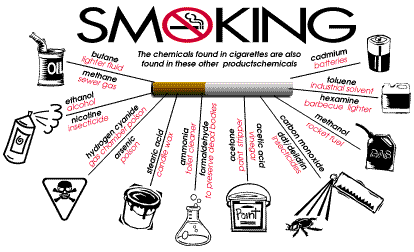
Home Page

Cannabis Information Page

Cannabis & Tobacco Comparison Page

I need not go into detail of the adverse health effects that the use of tobacco will cause as these are already well documented. However, the following list will outline some of these effects.
Cancers caused by smoking include lung, larynx, esophagus, mouth, and bladder. In addition, smoking is known to contribute to cancer of the cervix, pancreas, and kidneys.
Researchers have identified more than 43 chemicals in tobacco smoke that cause cancer in humans and animals. There are another 4000 chemicals in tobacco that are potentially harmful including Ammonia - used to clean windows, Acetone - used in nail polish, Methanol - used as rocket fuel, Nicotine - used as an insecticide, Formaldehyde - used to preserve the dead.
It is also well documented that smoking can cause chronic lung disease, coronary heart disease, and stroke.
Studies have demonstrated that women who use tobacco during pregnancy are more likely to have adverse birth outcomes, including low birthweight babies. Low birthweight is a leading cause of death among infants.
Studies indicate that nonsmokers are adversely affected by environmental tobacco smoke. Each year, because of exposure to environmental tobacco smoke, an estimated 3,000 nonsmoking Americans die of lung cancer, and 300,000 children suffer from lower respiratory tract infections. (US Centers for Disease Control)
All of the following ingredients are used to make 1 pack of commercial tobacco.
When chronically taken," it says here, "nicotine may result in: (1) positive reinforcement [it makes you feel good], (2) negative reinforcement [it may keep you from feeling bad], (3) reduction of body weight [by reducing appetite and increasing metabolic rate], (4) enhancement of performance, and protection against: (5) Parkinson's disease, (6) Tourette's disease [tics], (7) Alzheimer's disease, (8) ulcerative colitis and (9) sleep apnea. The reliability of these effects varies greatly but justifies the search for more therapeutic applications for this interesting compound."
Nicotine holds promise for treating diseases such as attention deficit hyperactivity disorder (ADHD), Parkinson's and Alzheimer's diseases, and schizophrenia. "Nicotine is a very simple molecule, and it affects receptors of many subtypes; therefore, the consequences, behavioral and biologic, are very broad," says Neil Grunberg, director of the Psychoendocrinology and Biochemistry Laboratory at the Uniformed Services University of the Health Sciences. However, Jon Lindstrom, professor of neuroscience at the University of Pennsylvania found that in order for nicotine to aid in the recovery from certain diseases, it must target the *4Ŗ2 receptor, but at the same time must aviod such receptors as the *3 as it's exposure to nicotine will result in an increase in heart rate.



